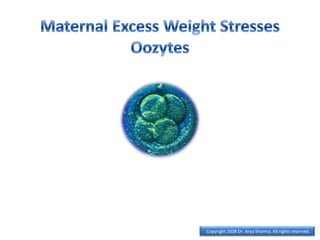Maternal excess weight stresses oozytes
- 1. Maternal Excess Weight Stresses Oozytes
- 2. Introduction Substantially increased body weight can have a significant negative impact on female fertility. But how exactly can excess body weight affect reproductive function in women? A possible explanation comes from a study by Natalia Igosheva and colleagues from KingŌĆÖs College London, London, UK, just published in PLoS.Notes: http://www.ncbi.nlm.nih.gov/pubmed/20404917
- 3. Study Using an established mouse model of maternal diet-induced obesity and live cell dynamic fluorescence imaging techniques, the researchers demonstrated that maternal obesity prior to conception is associated with altered mitochondria in mouse oocytes (eggs) and zygotes.
- 4. Fat vs Lean Specifically, maternal diet-induced obesity in mice led to an increase in mitochondrial potential, mitochondrial DNA content and biogenesis. Generation of reactive oxygen species (ROS) was raised while glutathione was depleted and the redox state became more oxidised, suggestive of oxidative stress. (for my non-technical readers, it suffices to say that none of this is good for the egg or the zygote). These altered mitochondrial properties were associated with significant developmental impairment as shown by the increased number of obese mothers who failed to support blastocyst formation compared to lean dams.
- 5. Strategy ŌĆō Weight Loss These studies show that compromised oocyte and early embryo mitochondrial metabolism, resulting from excessive nutrient exposure prior to and during conception, may underlie poor reproductive outcomes frequently reported in obese women.While the leap from mice to women may seem a bit of a stretch, there is no doubt that in many overweight and obese women trying to become pregnant, weight loss is clearly one of the most effective strategies.Now all we need are more effective strategies to help manage excess weight.
- 6. About Dr. Arya M. Sharma Dr. Arya M. Sharma, MD/PhD, FRCPC is Professor of Medicine & Chair for Obesity Research and Management at the University of Alberta, Edmonton, Canada. He is also the Medical Director of the Edmonton Capital Health RegionŌĆÖs interdisciplinary Weight Wise Program. Dr. Sharma is also the Scientific Director of the Canadian Obesity Network funded through the federal "Networks of Centres"ofExcellence program. Dr. Sharma has authored and co-authored more than 250 scientific articles and has lectured widely on the etiology and management of obesity and related cardiovascular disorders. He sends his informative messages through his blog Dr. SharmaŌĆÖs Obesity Notes. For more information on Obesity visit;Website: http://www.drsharma.ca/Facebook: http://www.facebook.com/pages/Dr-Arya-Sharma/115328778486319┬Ā





